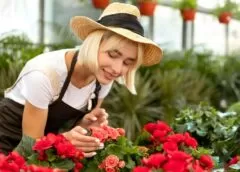Learning about gardening can be very overwhelming, but just like anything else, it can also be very quickly researched, taught, and learned. Read on to learn some helpful tips to help educate you on gardening, allowing you to become a more proficient gardener.
When you boil or steam vegetables for cooking, let the water cool and then use it to water your garden. This reduces your overall water usage, but it also provides a valuable source of nutrients to your place. Your potted plants, especially, will appreciate the extra nutrients provided by your vegetable water.
If you live in an area with clay soil, coat your shovel or gardening trowel with flour or car wax before digging your garden. This will prevent soil from sticking to the blade of your shovel, making your work much more manageable. It also lengthens the life of your shovel by preventing rust.
Don’t grow food no one will eat. Just because you can grow something doesn’t mean you should. If your kids don’t like spinach now, fresh spinach from the garden isn’t changed, and much will be wasted. Consider what you and your family like to eat, and then determine your garden accordingly.
Don’t forget to fertilize your garden! Water isn’t enough when it comes to growing delicious, healthy vegetables. Choose the fertilizer that you best like. Some people prefer manure, while others can’t get around its thought. There are many fertilizer options available at your local gardening store, so there is undoubtedly the right one for you.
Pass on the gardening love. Share some with friends and family once you have a great crop of vegetables. This simple act of kindness can be a massive motivator for you and a significant generosity to those around you! Plus, you may inspire others to start a garden of their own!
Choose your weed killer carefully and follow the directions when you need to control weed growth. Many weed killers have chemicals harmful to people if they are not appropriately applied. They are especially harmful to young children if they play around an area recently treated.
Small pebbles and stones make excellent plant markers. Collect some pebbles and stones to keep track of your plants while simultaneously adding a touch of natural beauty to your garden. Find stones with a reasonably smooth surface, and use a permanent marker or a little paint to place your plant names on them. This is a much prettier and more natural solution than the traditional plastic tags that clutter most gardens.
Put compost down on the soil in your garden about two weeks to a month before you plan to plant. This allows the compost enough time to integrate with the soil. Giving the compost time to stabilize means that your soil pH will be steady enough to test, and your plants will be ready to thrive when you plant them.
Think about planting perennials rather than annuals when it comes to flower gardening. The life cycle lasts only one year, which can be a waste of money and time. Perennials come back year after year for as long as four years, which means less time planting each year, and more time to enjoy instead.
An old wagon can help save time as well as your back. Instead of constantly having to retrieve your gardening tools as you work your way around your garden, commandeer an old child’s wagon. An old wagon works and a garden cart and can often be obtained free or very cheaply if you get it used.
Repel leaf-eating insects with chili pepper. If hungry insects ravage your plants’ foliage, add one tablespoon of red chili pepper or hot mustard to one quart of water in a spray bottle. Spray the foliage evenly, making sure to get the undersides of the leaves too. One taste of this spicy spray will send bugs on their way.
For those new to gardening, it is suggested to experiment with annuals. The following varieties are hardy, thrive in average soil, and take minimum care: sweet alyssum, marigold, zinnia, sunflower, nasturtium, petunia, and verbena. Just remember to deadhead them frequently to encourage new flowers to grow.
A significant first step to having a successful organic garden is to test the soil’s acidity in your garden. The ideal number is 6.5. If your soil is on the low end, it’s too acidic, and if it’s on the high end, it’s too alkaline. Neither of those situations lends itself to a successful garden. So by purchasing a soil testing kit before planting, you will assure yourself of a beautiful organic garden in the summer.
You should organize your garden and plan everything. Do not buy seeds if you do not know where to plant them. It would be best to plan on the long term for certain plants and short term for short-lived plants that will need to be replaced quickly.
Coffee grounds are an excellent addition to your soil. Plants can use the nitrogenous nutrients found in coffee grounds. The coffee grounds act as a powerful nitrogen source to help your plants bloom much quicker.
Variety makes for a better compost pile. Using a wide variety of materials in your compost pile provides a better pH balance, more nutrients, and microbial organisms. Shred materials when possible, as smaller particles decompose much faster, but having a few more extensive materials in there helps to improve the aeration. Don’t add any more materials once the composting process has begun for the best results.
That isn’t too difficult. Like any number of topics, much has been written on gardening, and therefore, a great deal of advice is available. The key is to find a good starting point and get going. The advice you read probably provided that, so start that garden now!




